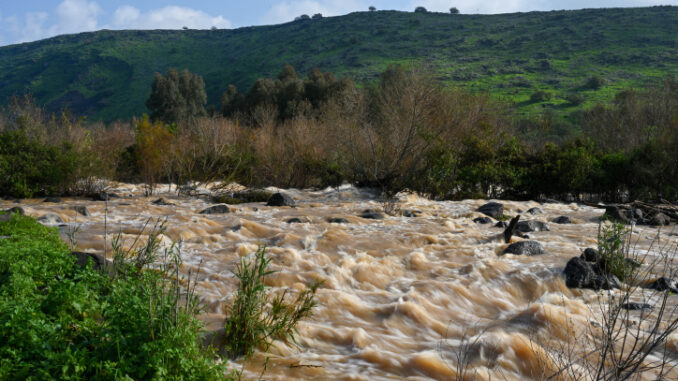T. Belman. I hope Abdullah abdicates before the end of the agreement.
The Kingdom of Jordan recently appealed to Israel to extend the two countries’ increased water supply agreement for another year. The current deal is due to expire in May. According to Kan11 News, Israel is currently holding consultations regarding the request and has not yet decided to respond positively, seeing as Jordanian politicians as well as the royal house have been launching vile antisemitic attacks against the Jewish State since October 7 (and they hadn’t been whispering sweet nothings before those atrocities).
Last November, Jordan’s Prime Minister Bisher al-Khasawneh told Al Arabiya his country would resort to “all the means in its power” to prevent Israel from implementing any transfer policy to expel PA Arabs en masse into Jordan. He added that “All the options are on the table,” and “the peace treaty would be a piece of paper on a shelf covered with dust if Israel did not respect its obligations and violated it.”
These words were not said in a vacuum but against the background of a militant atmosphere and turbulent public opinion in Jordan, which have been escalating since the outbreak of the war. The Jordanian public is maintaining daily demonstrations in front of the Israeli and the United States embassies in Amman, as well as in other centers throughout Jordan.
In those demonstrations, as well as in the opinion columns in the Jordanian media, calls are heard for the annulment of the peace agreement with Israel (including the economic agreements), and for prosecuting Israel for war crimes. Jordan and Israel may be moving toward severing their relations.
On January 25, Israel issued its first warning shot that actions have consequences. Israel’s Energy Ministry announced it was considering not extending the water agreement with Jordan, due to anti-Israeli statements heard from senior officials in the kingdom, led by Jordanian Foreign Minister Ayman al-Safadi. Last November, al-Safadi announced the suspension of the water agreement between Israel and Jordan following the war.
According to the current water agreement, Israel transfers 100 million cubic meters of water to Jordan each year, instead of 50 million cubic meters of water as stipulated in the peace agreement – in exchange for the production of electricity for Israel.
The double quota was created in response to the great water crisis in the Hashemite Kingdom. A final decision on the matter has not yet been made, and it depends on the development of Israeli relations with Jordan and how the Jordanians will express themselves regarding the war in the near future. As noted earlier, if the agreement is not extended, it will expire in May, and the quota will revert to 50 million cubic meters.

JORDAN IS BONE DRY
According to the World Bank, Jordan is one of the most water-scarce countries in the world and is grappling with a severe water crisis that constrains the country’s economic and human development. With only 97 cubic meters of water available per capita per year, Jordan’s water supply is significantly below the absolute water scarcity threshold of 500 cubic meters per capita per year.
“Over the past decade, population growth and the influx of refugees have severely strained water service delivery. Moreover, the combination of climate change and population growth is expected to further reduce per capita water resources availability by 30 percent by 2040,” notes the World Bank. “Limited water availability in Jordan is exacerbated by the fact that much of the water allocated for municipal use is lost: Over 50% of municipal water either leaks from pipes or is not paid for by the consumer.”
But Jordanians, who are 80% “Palestinians,” are blinded by their hatred for Israel and would rather literally perish of thirst than accept help from their Jewish neighbors to the west.
Collaboration concerning water resources played a vital role in the 1994 peace treaty between the two nations. Additionally, they formalized a water-for-energy pact during the United Nations climate conference in November 2022 at the Egyptian Red Sea resort of Sharm el Sheikh. However, when the agreement, facilitated by the United Arab Emirates, was initially disclosed in 2021 — entailing Jordan providing solar energy to Israel in return for water — protests erupted in Amman. The concept of relying heavily on Israeli water is unacceptable to the majority of Jordanians.
A few days ago, Israel submitted several requests to Jordan in exchange for the extension of the doubled water agreement: moderation of statements by Jordanian officials, including ministers and members of parliament, against Israel, and reduction of incitement within the kingdom against Israel.
A message was conveyed regarding the importance of returning the relations between the countries to order, including the return of the countries’ ambassadors to Amman and Tel Aviv.
It was well documented that the Nazis continued to run the trains to the death camps in Poland even though this harmed the war effort against the Allies. They were dedicated Jew haters. But the Nazis didn’t come close to the level of hatred shown by the Jordanians, who are willing to die of thirst to maintain their Jew-hatred.




That sounds like it would be better for Israel to allow them to take their preferred path to oblivion.
OK, business is business but does Israel actually need their energy? Who is profiting?